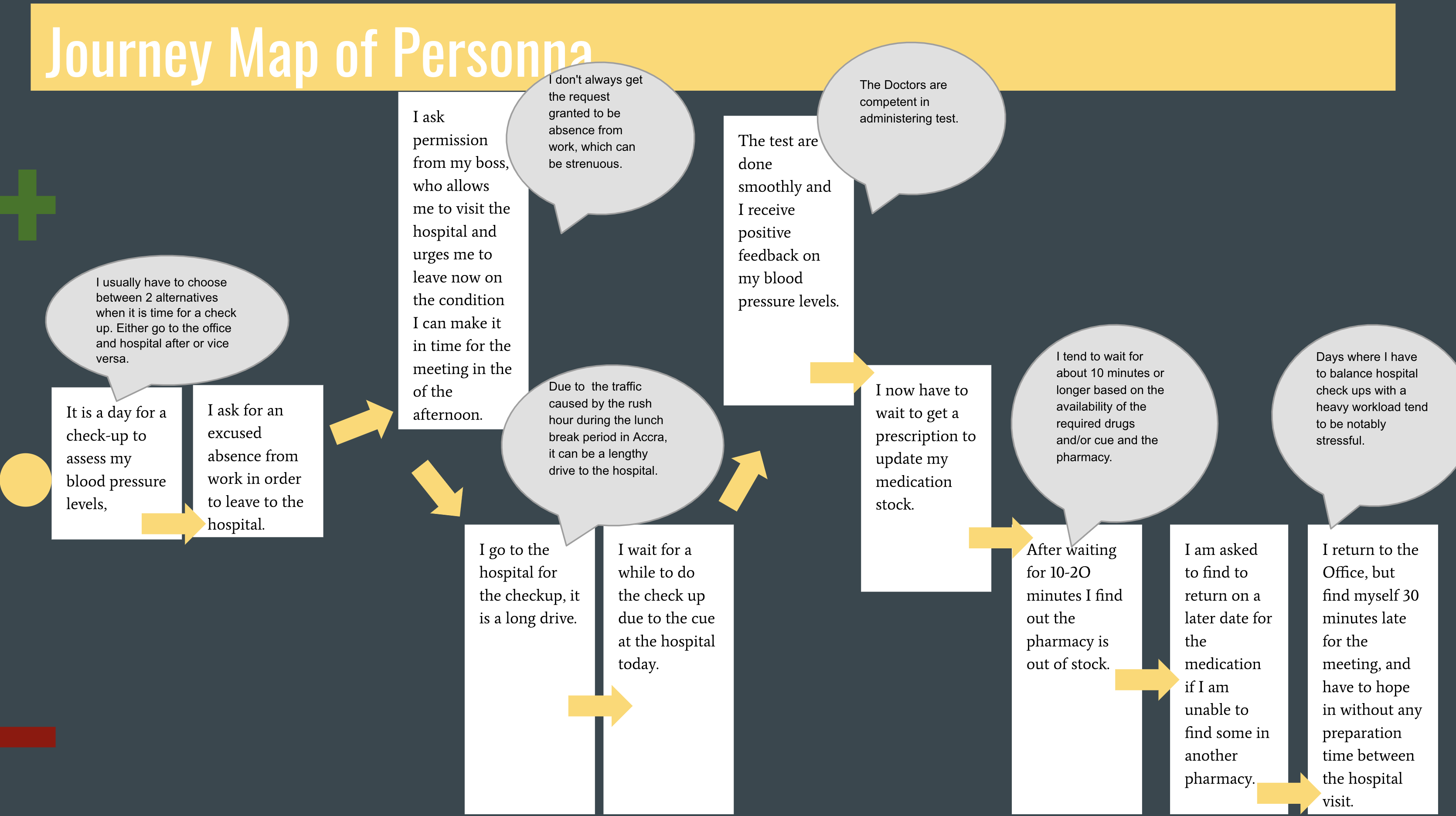Sub Challenge 2
How might we provide NCD patients with approved, easily accessible testing and monitoring system so they are empowered to conveniently manage their situation?
Target Market
The target market for this challenge were professionals living with non-communicable diseases, both young and old with ages ranging from 21 to 65, that are busy and require regular checkups, treatment or monitoring.
Both Users (Patients) and Stakeholders (Doctors and Pharmacists) were interviewed to capture a broad perspective of the HMW challenge and how the agents involved can be a part of the solution.
Ama Gymafi
Age:23Location:Sunyani, Ghana
Status:Single
Job:National Service Personnel

Bio
Ama is a young budding National Service Personnel working at the University of Energy and Natural Resources. Ama was diagnosed with Atrial Septal Defects (ASDs) 6 years ago with the full intensity of the condition being revealed 2 years ago following a heart scan. Ama makes a conscious effort not to engage activities she feels might make her sick, and is generally moderate about physical activities.
Wants & Needs
- A health package for her condition
- To be able to engage in more activities without fearing the effects on her health
- Access to easy testing and monitoring
Frustrations
- Uncertainty on what she is doing right or wrong
Beth Kodjoe
Age:56Location:Accra, Ghana
Status:Married
Job:Principle Private Secretary at WAEC

Bio
Beth Kodjoe is the principal private secretary of the Head Registrar at WAEC. This makes her job significantly demanding as she works at the Head Office and is responsible for managing all related affairs to the Registrar's Office. She is a mother of 3 and in her late 40s was diagnosed with Diabetes and High Blood Pressure not long after. Working at a government institutions provides her with health insurance benefits and more accessible testing and monitoring with an in office clinic, albeit better than it most private institutions, there are still parts of the process she feels can be improved.
Wants & Needs
- Access to a personal testing kit
- Affordable testing kits so people can have it at home
Frustrations
- Lack of knowledge on treatments
- Office work being affected on days she has to visit the medical center
Quotes from Respondents
From interviews with Hypertension patients
It came more from stress with mine. When I had it I was not that old for it to be normal. Living with it is not fun when you cannot enjoy somethings you would like to.
Creates a sense of fear and uncertainty, as you never know when you would have spikes in the BP.
Approval for absence from work is not always available.
From interviews with Asthma patients
I suffer from Diabetes and High Blood Pressure. The medication has affected my hair. It also does not allow me to enjoy things I used to eat to the fullest. That’s both diseases.
Lackadaisical attitude of some nurses could cause death of patients.
It has made me more conscious of my actions. I have to carry my asthma inhaler around, not engage in high energy activities.
Depending on where you are, accessing to treatment is difficult.
Makes breathing very uncomfortable.
From interviews with Diabetes patients
I suffer from Diabetes and High Blood Pressure. The medication has affected my hair. It also does not allow me to enjoy things I used to eat to the fullest. That’s both diseases.
It can affect work at the office on days I have to visit the medical center because I have to go there first. Either to go to the hospital first or go to work straight. Either way, after treatment, I have to wait for a while for the medicine. 10 to 20 minutes If they do not have what I need, either they give me a prescription or they get it and bring it later on.
Unmet Need
From the primary research conducted, the following findings were identified.
- General public knowledge on the NCDs
- Lack of guaranteed approval for absence from work to go for check-ups
- Difficulty in accessing treatment based on where you are in the country
- Lack of a comprehensive testing/monitoring/treating package to easy financial burden
Market Demand
The market demand for the solution determined by the willingness of the respondents to pay for a solution stemmed from the initially proposed HMW Question.
83.3% of respondents expressed an interest to pay for a solution that would enable chronic NCD patients have formal and approved more time-efficient and easily accessible testing and monitoring systems to enable them more conveniently manage their situation.
For monitoring High Blood Pressure, GHS 50 is the popular price for a solution in the form of a personal testing kit.
For Autism Spectrum Disorder (ASD) the patient is willing to pay between GHS 2000 to GHS 2500.
For Sickle Cell the patient is willing to pay not more than GHS 300.
Market Constraints
Key Behavioral or Market constraints and challenges identified.
Doctors and pharmacists expressed challenges they face when providing accessible testing and monitoring systems to NCD Patients:
High cost of blood sugar monitoring with diabetes patients
Nonchalant attitude of particularly asymptomatic patients
Stress of commuting to a health facility
Products/ Devices must be approved by FDA before being made available to market for purchase
Data Privacy
Challenges with medical fraud
Resources
Research data and other useful materials related to this challenge.
